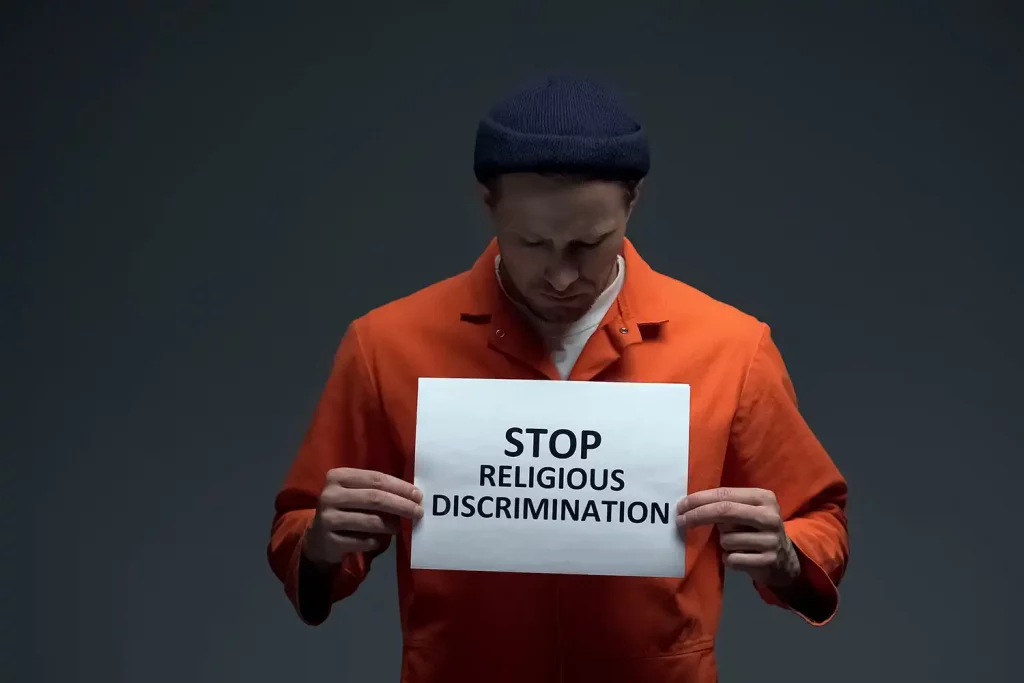Religion or belief discrimination in the workplace
This guide explains what ‘religion or belief discrimination’ at work means and what kinds of discrimination can be encountered by employees who hold particular religious or other beliefs.
It also gives you some practical tips on how to deal with such discrimination and how to make a claim for compensation because of it.
The guide complements our other website guides on discrimination and particularly:
- discrimination at work – an overview
- Discrimination compensation
- Preparing your schedule of loss for a tribunal claim
- Separate guides (listed at the end) for each of the discrimination areas that you can make a discrimination claim for, such as age, sex, disability and race.

What is religion or belief discrimination?
Religion or belief discrimination is when you’re treated badly because of your religion or belief and is one of the ‘characteristics’ specified as needing protection from acts of discrimination in the Equality Act 2010.
For the purposes of implementing the Equality Act, religion and belief are interpreted as follows:
Religion
Religion includes any religion, as long as it has a clear structure and belief system. It obviously includes the major religions like Islam, Christianity, Judaism and Buddhism. But includes smaller religions too, like Rastafarianism.
What about obscure religions? Or religions which you think perhaps are made up in order to provoke or make a point, like ‘Pastafarianism’ for example (see Wikipedia). The British courts haven’t yet considered whether Pastafarianism or similar actually are religions, but around the world, authorities are divided on such questions.
Discrimination is allowed if there’s a genuine occupational requirement
You apply to the local synagogue to be a rabbi. They reject you out of hand. Why? Because you’re not Jewish. They even state that explicitly in their rejection letter. You think you have the evidence needed to win your claim. But you wouldn’t, because when a particular religion is genuinely required for the job, it is lawful to discriminate.
Belief
What about belief? This means philosophical belief and must be genuinely held and more than an opinion. It must be cogent, serious and apply to an important aspect of human life or behaviour. ‘Ethical veganism’ for example, has been held to be a philosophical belief when it affects every aspect of the person’s life. See our guide on Vegan discrimination for more.
Conversely, vegetarianism has been held not to be a philosophical belief. But whether or not something counts as a belief will depend on all the facts of the situation. So, if a particular person’s vegetarianism is more than just a lifestyle and is a cogent belief system, it could be protected.
Some beliefs are not allowed
The belief has to be “worthy of respect in a democratic society”, though the threshold is very low. This test excludes really extreme beliefs such as Nazism which support serious hatred and violence.
Are you the victim of discrimination because of your religion or beliefs?
Talk to us
What types of religion or belief discrimination are there?
There are four main types of discrimination:
Direct religion or belief discrimination
This is when your employer or another employee (normally a manager) treats you worse than they treat employees who don’t share your religion or belief.
For example, if you can prove that a colleague was promoted instead of you because of your religion, then you’ve been treated less favourably because of your religion and you would win an employment tribunal claim.
For direct discrimination you need to identify a “comparator” – that’s a colleague in a similar situation to you in all ways except for your religion or belief who was treated better than you. In the above example, the comparator is the colleague who’s promoted.
If you can’t think of an actual comparator, you might be able to identify a “hypothetical” comparator. You would describe how that person would have been treated if they had existed.
Indirect religion or belief discrimination
Sometimes an employer treats everyone equally, but, intentionally or not, their actions are harmful to you. That would be “indirect discrimination”. Here are some examples:
Example 1
You’re a catering teacher who happens to be vegan. You’ve been doing the job just fine for a year. Part of your job includes coaching your students to assess the taste of the dishes they create. You taste many dishes and you give a few pointers to your students on tasting chicken, pork and cheesy dishes. And then you’re told you have to taste all of the food that’s prepared.
Here, the school’s new policy of requiring all catering teachers to taste all food is applied the same to everyone, but vegans are badly affected by the rule. So are certain other groups, such as vegetarians, Jews, Muslims or those who are lactose intolerant.
An employer can legally try to justify indirect discrimination (unlike direct justification). They could argue that it really is important for the catering teacher to taste all the food and argue that the teacher couldn’t possibly teach others how roast chicken should taste without tasting it themselves?
Example 2
A further example would be if a football ground required its security staff to work on Saturdays because that’s when matches are on. That requirement would be bad for religious Jewish security guards. But the football club might be able to justify the requirement, as working when matches are on is essential to the job.

Harassment related to religion or belief
Harassment could be thought of as bullying related to the person’s religion or belief. To be precise, harassment is unwanted conduct related to the religion or belief which has the purpose or effect of violating the person’s dignity or creating an intimidating, hostile, degrading, humiliating or offensive environment for them.
Harassment depends on the victim’s perceptions and feelings about the circumstances, rather than on the intention of the person who’s harassing someone.
But what if there is lots of slightly offensive banter in the office? What if everyone’s always lightheartedly insulting others, including the employee in question? You laugh at their religion; they laugh at something about you.
If it’s not unwanted, it’s not harassment. So if a person “gives as good as they get”, it might not be harassment at all.
Victimisation related to religion or belief
Victimised is a very specific term in the Equality Act 2010. It means treating someone badly because they have complained, or done something connected with a complaint about discrimination.
For example, in the vegan example mentioned earlier, if a colleague of the catering teacher complained about the discrimination against the catering teacher and the colleague was treated badly because of their complaint, that would be victimisation.

What to do if you’re discriminated against?
How you deal with discrimination will depend on the situation. For example, how badly you’re affected, how long it’s gone on for, whether you’ve already complained informally, the seniority of the discriminator.
You have a few options, such as:
Raising a grievance about the discrimination
You could raise a grievance, which is a formal complaint to your employers
Negotiating a settlement agreement
You could try to reach a settlement agreement, which you would do on a “without prejudice” basis, meaning it would be off the record. If you think that the situation can’t be rectified and you want to quit, then a without prejudice discussion often brings things to a swifter and more favourable conclusion.
Issuing an employment tribunal claim
You can issue an employment tribunal claim whilst still employed and you shouldn’t be treated badly because of it as that would be victimisation. However, in practice, especially in small businesses, employment relationships don’t normally survive an employment tribunal claim.
Resigning
As a last resort, you could resign, claiming constructive unfair dismissal and discrimination, although we would strongly recommend you didn’t do this before you had entirely run out of all other options.
If you have left your employment, then you lose your leverage in any negotiations and you can no longer readily gather evidence to support your case.
How much could your discrimination compensation be?
How much you might get for discrimination compensation in more depth in our guide on discrimination compensation and also in our guide on preparing your tribunal schedule of loss, so will only outline it very briefly on this page.
Discrimination compensation can be awarded for:
- Financial loss caused by the discriminatory act
- Injury to feelings and sometimes also
- Personal injury
For example, if your dismissal was discriminatory then you’d be awarded compensation for financial loss during the time you’re likely to be off work.
Injury to feelings is compensation for the distress caused. One-off or unintended acts would get less injury to feelings.
Personal injury is where you suffer physical or more serious mental health injury and requires medical evidence.
Higher awards are given for lengthy periods of intentional harassment.
We normally advise our clients to try to settle their discrimination dispute by means of a settlement agreement rather than waiting for an award from an employment tribunal. You are in a good position to negotiate a settlement when you are still employed and it is quicker and less stressful than embarking on an employment tribunal journey.
How can you prove religion or belief discrimination?
Sometimes the evidence is obvious. If your boss sends an email saying they don’t like people of your religion, you have irrefutable evidence and a strong claim. As you might imagine, that rarely happens!
Often discrimination happens in a room with just you and the discriminator. In that case, it’s your word against theirs if it goes to an employment tribunal. If other people witnessed the discrimination, they may give supporting evidence – though if they’re still employed they may be reluctant to do that.
Think creatively about evidence. For example, after your boss verbally abused you because of your religion, you might have left work and immediately sent a WhatsApp message to a friend complaining about it. That would be good evidence at an employment tribunal.

Should you claim for discrimination or unfair dismissal if you’re dismissed?
If you’re dismissed, does it matter whether you bring a claim for unfair dismissal or discrimination?
Discrimination claims are particularly important for new staff – an ordinary unfair dismissal claim requires a minimum of two years’ employment before bringing a claim (though certain reasons for dismissal are “automatically unfair” and don’t require two years’ service. See our guide on unfair dismissal for more.
The other big difference is that loss of earnings compensation for unfair dismissal is capped at the lower of one year’s gross pay or the statutory maximum, which is £118,223 – as from April 2025.
That cap doesn’t exist in discrimination cases – so if you’re really badly affected by your employer’s actions and might never get a job again, damages will be higher for a discrimination claim.
On the other hand, discrimination can be much harder to prove than unfair dismissal as it’s often done in a way that is not immediately apparent to other people and also in a furtive and secretive way
If you have been employed for over two years, it might be possible to claim for both unfair dismissal and discrimination. However, we would strongly recommend that you took qualified legal advice before taking any such decision as it could significantly affect your claim if not handled correctly.
Want help with your claim for religion or belief discrimination?
Contact Monaco Solicitors employment law specialists
Enquire Now
Next steps
If you think you have been discriminated against at work because of your religion or beliefs, you may well have a case for a settlement agreement or an employment tribunal claim.
Discrimination cases require particularly sensitive handling by experienced employment solicitors like those at Monaco Solicitors, who know what they are doing and how best to help you with your claim.
So if you would like to consult one of our experts, please get in touch:
- For a callback via this link,
- Phone 020 7717 5259
- Email communications@monacosolicitors.co.uk
Our related guides
- Discrimination at work
- Discrimination compensation: Settlements and tribunal awards
- Age discrimination at work: a guide for employees
- Disability discrimination at work
- Mental health and discrimination at work
- Race discrimination in the workplace
- Sex discrimination at work
- Vegan discrimination in the workplace